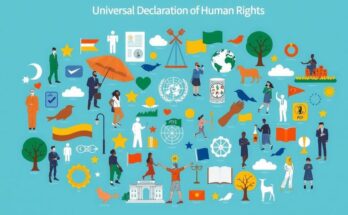Saudi Arabia and the 2034 World Cup: A Troubling Alliance
The recent announcement of Saudi Arabia as the host for the 2034 World Cup highlights ongoing issues concerning human rights within the realm of global sports. Critics argue that the nation aims to use this prestigious event as a tool of sportswashing, attempting to distract the world from its numerous human rights violations. This follows a wider pattern of the kingdom’s engagement with high-profile sports events, such as Formula 1 and golf tournaments.
Shadows of the Past
Saudi Arabia’s desire for global respectability is palpable, especially after the intense backlash surrounding the murder of journalist Jamal Khashoggi in 2018—an act viewed by U.S. intelligence as state-sanctioned, which Saudi Arabia denies. According to lawyer Rodney Dixon, it’s critical that organizations like FIFA consider human rights standings before endorsing nations like Saudi Arabia as hosts. “FIFA should not permit Saudi Arabia to host the World Cup if it continues to flagrantly disregard human rights,” he cautioned.
Human Rights Concerns
Numerous reports paint a dire picture of Saudi Arabia’s human rights record, particularly regarding women’s and LGBTQ+ rights, as well as freedom of expression. In fact, the latest Freedom House report indicates that the nation restricts almost all political rights and civil liberties. Such restrictions cast serious doubts on the genuine intentions behind hosting the World Cup, undermining FIFA’s commitment to promoting human rights.
FIFA’s Controversial Decision
FIFA’s choice to award the World Cup to Saudi Arabia has garnered significant skepticism, especially due to the expedited bidding process that raised questions about its transparency. This decision appears at odds with FIFA’s own human rights policy, adopted in 2017, which pledges to promote human rights standards globally.
A Supported Approach
The Football Association of England has also backed Saudi Arabia’s bid, emphasizing assurances from the Saudi Arabian Football Federation regarding a friendly environment for fans. However, claims of inclusivity ring hollow amidst strict laws against same-sex relations, provoking doubts among LGBTQ+ supporters, such as footballer Jake Daniels, who expressed that he wouldn’t feel safe at a Saudi World Cup.
Saudi Arabia’s Ambitious Sporting Aspirations
Saudi Arabia’s ambition in the sports arena is undeniable, having hosted various major events and securing future tournaments such as the 2025 Supercoppa Italiana. Moreover, the state showcased its rising ambition by welcoming high-profile boxing matches, demonstrating its intent to establish a more significant presence in global sports.
Rethinking Sporting Ties with Autocratic Nations
While Saudi Arabia posits that its investments in sports aim to shift societal attitudes positively, such narratives echo arguments made during Qatar’s 2022 World Cup hosting—with little fundamental change observed post-event. We must critically evaluate the motivations behind autocratic regimes seeking sports loyalties and champion the call against ongoing human rights violations that stifle the freedom of expression. The global sports community must successfully safeguard the balance between promoting sporting events and standing firm against rights abuses.
Saudi Arabia has been chosen to host the 2034 World Cup, raising concerns over its human rights abuses, including treatment of women and LGBTQ+ rights. Critics accuse the nation of sportswashing, distracting from its poor record. FIFA’s decision, supported by the FA, comes under scrutiny for violating its own human rights policy. With a growing presence in global sports, questions linger on the ethical implications of such partnerships.
Saudi Arabia’s hosting of the 2034 World Cup raises crucial questions about the intersection of sports and human rights. Critics contend this decision reflects an ongoing trend of sportswashing and distracts from the nation’s troubling record on various rights issues. As sporting organizations consider their involvement with such nations, a commitment to human rights must remain at the forefront of decision-making processes.
Original Source: www.indexoncensorship.org



